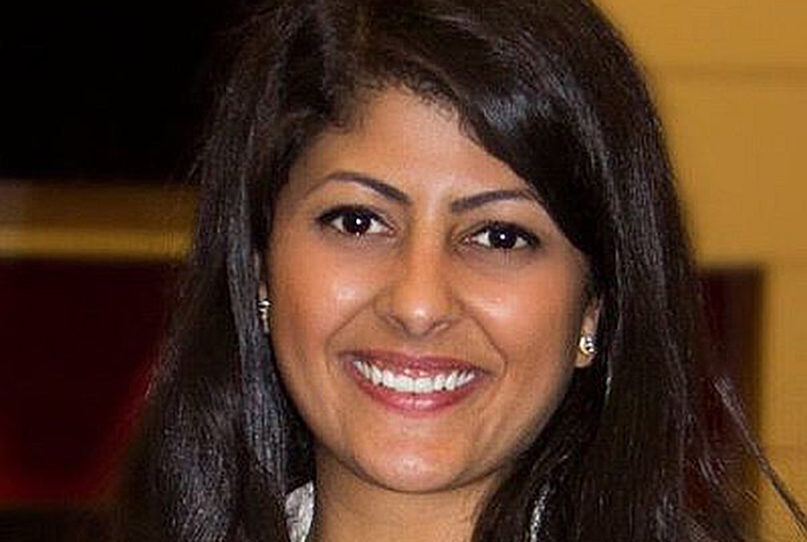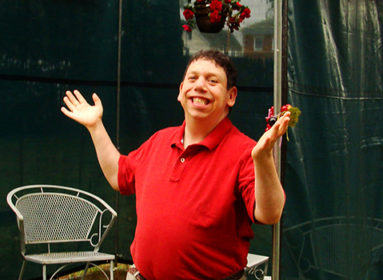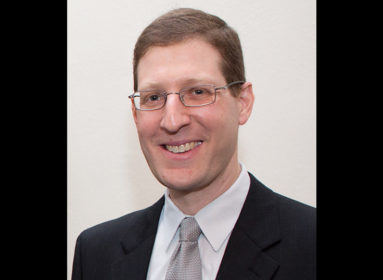
First Arab-Israeli Rhodes Scholar will speak on minorities and shared existence in Israel
By Stacey Dresner
Haifa native Lian Najami is the first Arab-Israeli Rhodes Scholar.
Raised in a Muslim family, the 25-year-old Najami grew up in one of the city’s most multicultural and inclusive neighborhoods.
At the age of 12 she contracted a nervous system condition that paralyzed her from the knees down. While today she is able to walk short distances, her condition, which doctors at Rambam Medical Center in Haifa are still trying to fully diagnose, causes chronic pain.
But what she calls her “different abilities” don’t interfere with Najami’s goals of shared existence in an inclusive Israel and advocating for people with disabilities in the Middle East. She has shared her vision as a featured speaker in the U.S., the UK and Germany.
Najami graduated from the University of Haifa in 2016 with a degree in political science and international affairs. She was featured at the 2016 Forbes 30 under 30 Summit in Israel and then worked as a Lantos Fellow in Washington, D.C., for U.S. Sen. Brian Schatz, a Jewish Democrat from Hawaii. Najami will begin her masters at Oxford in October, studying comparative politics with a focus on inclusion policy.
Najami will talk about her life in Israel as an Arab-Israel at Congregation Beth Israel, 701 Farmington Ave., West Hartford, on Thursday, Sept. 19 at 7 p.m. The program is co-hosted by Congregation Beth El and The Emanuel Synagogue.
The Ledger recently spoke to Lian Najami about her experience growing up as an Arab-Israel and her advocacy work.
JEWISH LEDGER: Tell us about the community where you were raised.
LIAN NAJAMI (LN): I grew up in Haifa in a very special neighborhood, called Ein Hayam-Wadi Jamal – it depends on whether you speak Hebrew or Arabic.
It’s a special neighborhood because it’s about 50-50 Jews and Arabs. A lot of people think Haifa is multi-cultural, but in fact the population is only 10 percent Arab; the majority is Jewish.
Wadi Jamal, unfortunately, is one of the rare neighborhoods that is a complete mixture. It’s not just about Jews and Arabs, but it really includes the Israeli identity spectrum – Ashkenazi Jews, Moroccan Jews, every single kind you can think of and Arabs as well.
I met my best friend, Rita, when I was four years old. She is Jewish from a Russian background. I saw her at the playground and I said, ‘Hey, do you want to play?’ and the rest is history. So, when I later attended Arabic speaking schools and someone would generalize about Jews, I would say, ‘Wait a second, Rita is Jewish but she doesn’t fit what you are saying.’ That’s when I started to understand that one of the enemies of humanity is definitely generalization.
JL: Have you felt inclusion as an Arab-Israeli?
LN: Leaving the neighborhood and being in Haifa or Tel Aviv or Jerusalem, you definitely get hit in the face [with some discrimination]. Even if you have a little glimmer of thinking that you are 100 percent Israeli – “I’m just like you!” – you are kind of told, well not really, you are not there yet. You are here by default. Your ancestors stayed here in Israel after 1948 and all the Arabs that stayed got their citizenship immediately, so it is not like they chose to come here, they were here already.
The main issues I have seen are in the education system. My siblings and I have tasted discrimination when it comes to quality of education in the public education system in Haifa and in general. When it came to high school my parents made the decision to put us in private schools because the one public school that was Arabic speaking could not have equipped us with the tools to excel. I’m a first generation student, so my parents really knew that making sure we had an academic background would enhance our chances of fitting in and being included; being judged by our merits and not by our ethnicity. So, the education system is where I felt a little bit like an outsider.
Another one would have to be [the experiences of] my own Arab family members who live in the villages. I sometimes need to remind myself that I was lucky to grow up in Haifa which is the third largest city in Israel; so clearly, transportation, hospitals, medical care – all of that is just out there for me. Whereas if I go to the village where my aunts live which is 10 minutes from Haifa University, they sometimes don’t really have water or don’t know when they are going to cut it off. This upsets me because they are taxpayers just like my family in Haifa.
Obviously one of the hardest things Arabs face is when they are about to travel. I myself face screening, and have travelled to countless speaking engagements in collaboration with the [Israel] Ministry of Foreign Affairs where I am trying to show the world the different face of Israel. And I am still being taken aside, being researched and examined as if I am going to commit a terrorist attack.
JL: Do you understand the other side of the security issue – that is, the fear of terror attacks that Israeli Jews experience?
LN: I completely understand and that is why I never [protest] despite the fact that I go through it every single time, and I fly on an almost monthly, if not weekly, basis. I used to get agitated or say something like, “I’m actually going right now to be with the ambassador of Israel to Germany to talk about Israel and this is going to be in my talk.” Then later on I understood where it was coming from.
In the 21st century, with the technology that we have, maybe Israel can find a way to better utilize data to make sure not every citizen who is an Arab will be put through this screening, but instead will be limited to civilians who are suspected of terrorism.
I do joke about it every time I go on a flight that leaves from Israel – I say I definitely feel safer. At the same time, I say, if you want to do screening then also do it to my Jewish friends too. It doesn’t sit right with me.
JL: What made you become such an ardent advocate for coexistence?
LN: I think when I was younger and growing up my friends were Jewish and from a very young age I never saw them as Jewish – I just saw them as my friends. I think that was such a great experience for me growing up, because it definitely shaped my thinking and perspective on shared existence in Israel.
But I think it was really after I started dealing with my illness when I was 12 years old. I used to dance. I was in a band. I played soccer. Then all these activities were taken away from me. I started volunteering at the center in my neighborhood in order to find something to help myself feel I was a value to society and that I was making a contribution. The center understands the environment that it is in, given that it is a shared and diverse neighborhood, and they altered all of their activities around that concept. So I think it was that exposure from the age of 12, volunteering in all of these social activities that pushed for shared existence that inspired me. Later on, at the University of Haifa, I was a part of a Jewish Arab Community Leadership program. I found my calling.
I think of myself as part of four different minority groups in Israel and I just want to feel like I belong. I think striving for a feeling of belonging is what inspires me to want to make sure other people in Israel that aren’t Jewish feel like they belong.
JL: Are you sympathetic with the BDS movement and academic boycotts of Israel?
LN: When I look at the BDS movement, I understand that it is a legitimate form of protest in the 21st century and consumers have the free will to choose where and why to buy their products. I don’t agree with the aims of the movement, however, and don’t believe that promoting BDS is what will change the situation here in Israel or for Palestinians, particularly when it comes to academic boycotts.
Despite a clear aim, stated on their website, saying that they want to help Palestinians and Arab citizens of Israel (which they refer to as Occupied Palestine), I strongly believe that when it comes to academic boycotts, they are simply harming us. I am an Arab, living in Israel, but the BDS movement would shut down my opportunities to travel abroad and build collaborative networks simply because I went to Haifa University.
Indeed, there are many more shades of gray and nuance to the debate than the simplistic black and white narrative that is so often portrayed. For example, sometimes a simple Facebook campaign run in the U.S. by BDS can have a seriously negative impact on the lives of Palestinians and Arabs in Israel thousands of miles away. The best example for that is SodaStream, where more than 70 different Palestinian families lost their jobs and monthly incomes due to pressure from the BDS community to close down their factory and relocate it.
We are only going to make progress with open, honest, and frank discussions. We are only going to improve the situation if we find commonalities and work collectively towards solutions. Academia is where ideas are supposed to be shared in an open space, but by shutting down debate, closing down modes for dialogue, and blocking opportunities for knowledge exchange, boycotts will only have an adverse impact on the situation.
Admittance to Lian Najami’s talk at Congregation Beth Israel on Sept. 19, 7 p.m., is FREE and open to the public. For more information, call (860) 233-8215 or visit cbict.org.







 Southern New England Jewish Ledger
Southern New England Jewish Ledger













